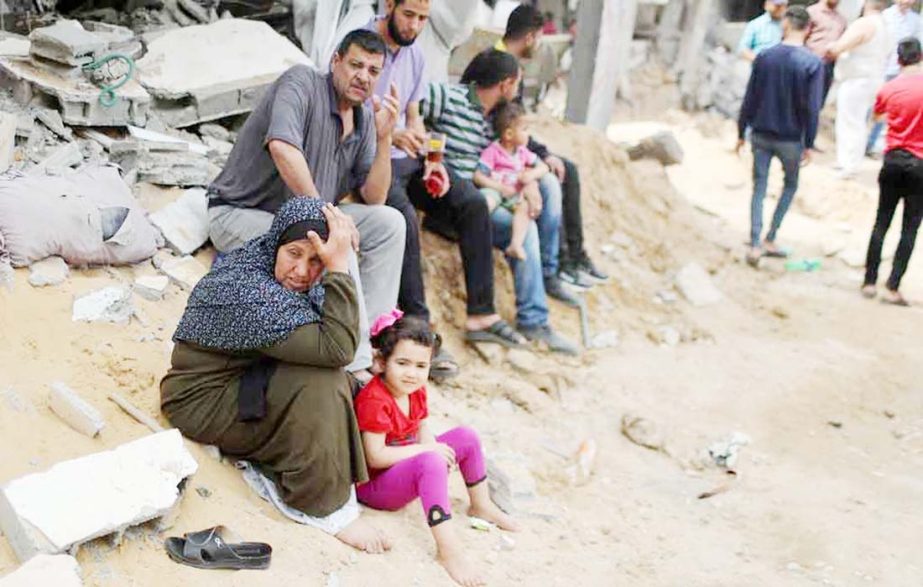
Al Jazeera :
Gaza City – As a ceasefire in Gaza takes hold, stories of fear, resignation, and survival are emerging from the besieged territory.
Many terrified civilians began saying their final goodbyes to family members and friends during the 11-day onslaught, fearing they would die in one of the heaviest Israeli attacks on the Palestinian enclave ever.
Ibrahim al-Talaa, 17, lives in Mughazi camp in the centre of the Gaza Strip. He was among those who sent a final farewell to extended family members and friends through Facebook.
Ibrahim recounted his toughest day in the bloody attack as Israeli fighter jets heavily bombed near his home. He said he felt like it was the end for himself and loved ones surrounding him.
“The Israeli warplanes bombed many different places in my area with more than 40 consecutive missiles, without issuing the prior warnings they used to issue in the past three wars. The sound of the bombing and shelling was so terrifying that I cannot describe it,” Ibrahim said.
“As the bombs fell heavy and close, the house was shaking as if it would fall on our heads… My nerves collapsed and I was about to cry out, but I tried to restrain myself, just to give my family some strength. I saw my 13-year-old sister crying in silence. I hugged her for a while trying to cheer her up. I brought her a glass of water and tried to lessen her fear, although I was beyond scared.”
The Palestinian death toll on Saturday stood at 248, including 66 children, with more than 1,900 people wounded from Israeli air and artillery attacks. Rocket fire killed at least 12 people in Israel, including two children.
After the Israeli military action against Gaza began, Ibrahim’s family, including his parents, four brothers, and three sisters, gathered in one room, hoping they would all survive – or die – together.
As Israeli jets attacked, the al-Talaa family began saying their goodbyes.
“While hearing the sound of bombs getting much closer and several ambulances coming, we gave farewell looks to one another, and then we warmly hugged,” Ibrahim said.
The teenager then wrote a Facebook farewell post. “My friend called me to check on me after I posted it, and I told him how much I love him,” he said.
“As a Palestinian in Gaza, I am deprived of my simple right to live in safety. I asked my friend to spread my message that I won’t forgive any human being and president in this world who supports the Israeli occupation, normalises with them, or even stays in silence.”
Reem Hani, 25, lives in the Shuja’iyya neighbourhood with her parents and five siblings. On May 14, the Israeli military started shelling the eastern border of Gaza City about 100 metres away.
“After four hours, the shelling became much heavier and closer, striking randomly in all directions,” she told Al Jazeera. “Crazily, my older brother cried out at us to rush and get in the car. We brought a bag of belongings including all our documents.”
In 2014, Israel also attacked the Shuja’iyya neighbourhood with jets and tanks, razing most houses to the ground. While fleeing in their father’s car this time, Reem witnessed the same scene from six years earlier with hundreds of people running on the streets, some barefoot and carrying their kids, all heading to the west of the Gaza Strip.
Others were riding motorcycles, taxis, and donkeys, the constant blasts illuminating the darkness.
“My family and I survived in 2014, but we didn’t expect that we would survive this time because they launched more than 50 air attacks around us while we were in the car. I kept hugging my young brothers, shedding tears, and fearing I’d die before we arrived at our destination,” said Reem.
“I also sent farewell messages to my close friends, asking them to keep me in their thoughts and prayers after I die.”
Maha Saher, 27, from the al-Zaytoun neighbourhood, is a mother of two daughters – Sara, 4, and Rama, five months old. Her husband is a photojournalist so when attacks begin in Gaza, he must leave his family to do his work.
“I am fully responsible for protecting my daughters from every tiny harm in this brutal war in the absence of my husband,” Maha said.
“I fear for my husband while he is conveying the truth by his photos to the Western world, and for my daughters because all of us – children, women, journalists, doctors and all civilians – are being targeted by them,” she added.
Israeli warplanes bombed three houses on al-Wehda street last Sunday, crushing the inhabitants underneath the rubble, an attack that killed 42 civilians, mostly children and women.
“They then destroyed the street itself to prevent the ambulances and fire trucks from reaching the destroyed buildings and wounded people,” Maha said.
“I fear they will target my apartment while we are sleeping, as they did with the al-Wehda street massacre. I don’t fear death itself. But I fear to lose one of my children – or they to lose me.”
She said she stayed up all night through the attacks to watch over her children and then slept for about 30 minutes after sunrise each day. During the heaviest of attacks, her daughter Sara wept uncontrollably, asking for her father to return home.
“I phoned my husband to let Sara speak with him. She told him how much she missed him and asked him to come and play with her. He stayed silent, unable to answer,” said Maha.
Maha and her family “survived with the mercy of our God”, she said, and they are now staying with her uncle in a rented flat, after his own apartment was targeted by a drone strike.

